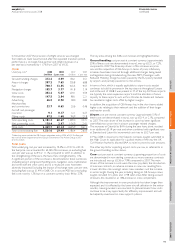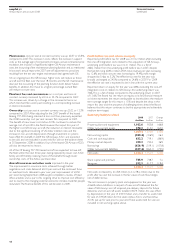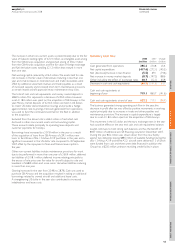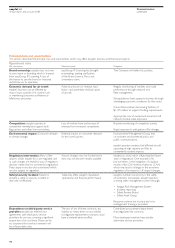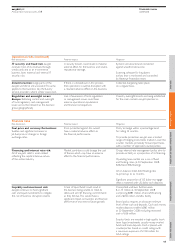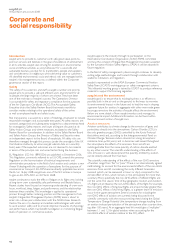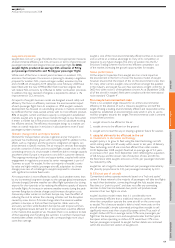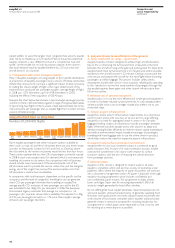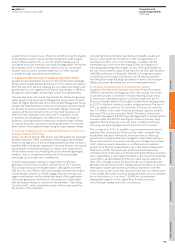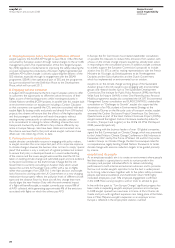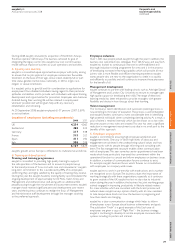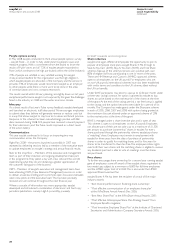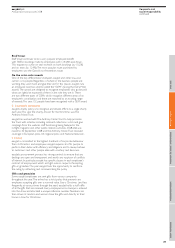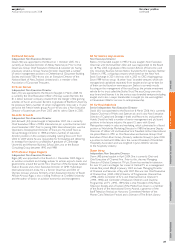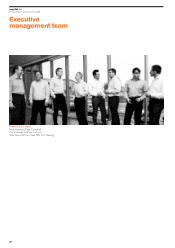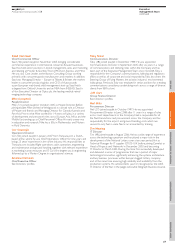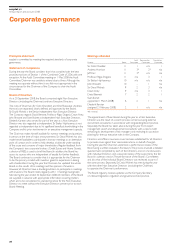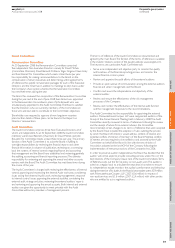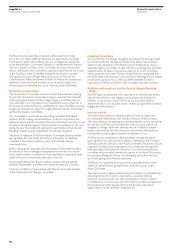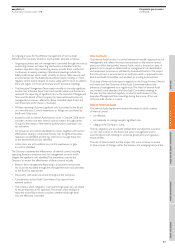EasyJet 2008 Annual Report Download - page 23
Download and view the complete annual report
Please find page 23 of the 2008 EasyJet annual report below. You can navigate through the pages in the report by either clicking on the pages listed below, or by using the keyword search tool below to find specific information within the annual report.
OverviewDirectors’ reportReport on Directors’ remunerationFinancial informationOther information
21
easyJet plc
Annual report and accounts 2008
Corporate and
social responsibility
continued
Employee induction
Over 1,000 new people joined easyJet through the year. In addition, the
business also welcomed new colleagues from GB Airways and easyTech.
easyJet has looked to continuously improve its well-established and
thorough induction training programme for crew and is in the process
of developing increased e-learning capability which will provide all new
joiners with a more flexible and efficient learning experience. easyJet
wants people who are new to the organisation to settle in as quickly
and efficiently as possible, and will continue to improve these processes
for the benefit of all.
Management development
easyJet continues to partner with leading schools such as Ashridge School
of Management and London City University to ensure its managers get
high quality support in developing their skills. The range of electronic
learning media has been enhanced to provide managers with greater
flexibility and choice in how they go about their learning.
Talent management
The Company’s talent identification and succession planning process is
now entering its third year of execution. The process is well embedded
and easyJet’s leaders continue to invest considerable time in identifying
high potential individuals when completing planning activity. As a result, a
pool of talent is retained internally which can be drawn on as key roles
become vacant or new roles are created. This year has seen a significant
reduction in management recruitment costs due in no small part to the
benefits of this approach.
C. Employee engagement
easyJet is committed to ensuring high employee satisfaction and
engagement levels. One way in which high levels of advocacy and
engagement are achieved is the underpinning cultural values and how
easyJet works with its people through informing and consulting with
them. The flat management structure enables direct communication
with all employees. This year some key senior appointments have been
made which have particularly improved the commitment within the
operational function to consult and inform employees on business issues.
In addition, a number of communication forums continue to exist,
for example easyJet’s business forum, which focuses on consultations
with employees on company wide issues.
easyJet aspires to work in partnership with trade unions and a number
are recognised across Europe. The business values the importance of
working strategically with these organisations, especially as it continues
to grow outside of the UK. easyJet has lost no days due to industrial
action during the year. In addition, the business has joint working groups
actively engaged in improving productivity in lifestyle related matters
for crew; activities which are consistent with the brand promise and
cultural values. easyJet surveys opinion directly with all crew members
to take temperature checks on how the business is progressing and
how their needs are changing.
easyJet has a clear communication strategy which helps to inform
all employees across Europe about business achievements and goals.
The publication “Fresh” is a good example of this. Each year all
employees are given a copy of “Flight Plan” – the business strategy.
easyJet is continuing to develop its on-line employee communication
systems including its portals and intranet.
During 2008, easyJet concluded its acquisition of the British Airways
franchise operator GB Airways. The business achieved its goal of
integrating the legacy carrier into easyJet’s low cost carrier business
model without impact on business as usual operations and activities.
A. Equality and diversity
easyJet is a committed equal opportunities employer with policy aiming
to ensure that no job applicant or employee receives less favourable
treatment on the basis of their age, colour, creed, disability, full or part
time status, gender, marital status, nationality or ethnic origin, race,
religion or sexual orientation.
It is easyJet’s policy to give full and fair consideration to applications for
employment from disabled individuals, having regard to their particular
aptitudes and abilities, and to provide such individuals with equal training,
development and opportunities for promotion. Employees who become
disabled during their working life will be retained in employment
wherever possible and will be given help with any necessary
rehabilitation and retraining.
At 30 September 2008, easyJet employed 6,107 persons (2007: 5,674)
as set out below:
Location of employees (including secondments)
2008 2007
UK 4,234 4,063
Switzerland 480 424
Germany 317 448
France 315 203
Spain 411 290
Italy 350 246
6,107 5,674
easyJet’s growth across Europe is reflected in its multinational workforce.
B. Training and development
Training and training programmes
easyJet is committed to providing high quality training to support
the safe operation of the business and to ensure its people live up
to the brand promise of “Low cost with care and convenience”. easyJet’s
long-term commitment to this is evidenced by 84% of its employees
confirming they are highly satisfied by the quality of training they receive.
During the year, the easyJet Academy training facility accommodated the
ongoing development of approximately 6,100 Pilots, Cabin Crew and
Management and Administrative staff, along with an additional 650
people passing through the recruitment and assessment centres. easyJet’s
managers have received significant personal development over recent
years and the business continues to realign the focus of Management
and Administrative staff development through line manager coaching
as the preferred approach.


